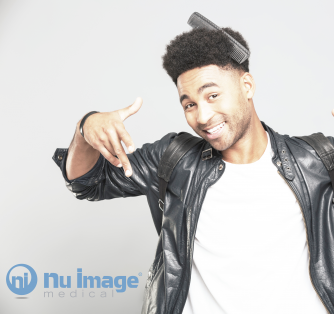Menu
Weight loss
Hormones
Sex
EXPLORE
MEET NU IMAGE MEDICAL
TREATMENTS
MEET NU IMAGE MEDICAL
TREATMENTS
MEET NU IMAGE MEDICAL
Foods That Feed Your Hair


The dieting advice that tends to motivate people toward better choices is that “you are what you eat.” The condition of your skin and your overall weight are generally strong indicators of your health, but at the very least, speak volumes about your diet. Did you know that your hair can also be a telltale sign of your internal health? Each strand of hair is grown and maintained by thousands of cells, and these organisms rely on key nutrients to function properly and efficiently. With the right foods in your diet, you can encourage healthy, strong, beautiful hair. Here are the food categories you should be conscious of including in your meals.
Protein
Your hair follicles are primarily made of protein. For strong, healthy hair, you should be consuming protein at every meal. The recommended daily amount is between 45-50 grams a day. Without enough protein, your hair is more likely to become brittle and dry. This makes it weaker and prone to breakage. If protein levels far fall enough, it can restrict normal hair growth and create conditions of serious hair loss. To boost your intake of protein, consume dairy products, eggs, turkey, fish, or chicken. If you prefer vegetables, include nuts and legumes.
Iron
Too little iron in the diet can cause balding and shedding, creating conditions of alopecia. Just like protein keeps hair strong, iron is important for keeping cells rich with blood. The roots and hair follicles are fed by a rich blood supply, and without this nutrition, your hair growth cycle will become stunted. It can also result in shedding. Those with low iron levels often experience anemia, which presents itself through extreme fatigue, pale skin, cold hands or feet, and brittle nails. With green leafy vegetables like kale, broccoli, spinach, or salad greens, you can help raise your iron levels. Red meats, fish, chicken, and lentils can also put more iron in your diet.
Vitamin C
Your body, and subsequently hair follicles, needs vitamin C to help absorb iron from the foods you eat. This vitamin is also an antioxidant, helping the body defend against free radicals that kill or damage cellular growth. Vitamin C is also needed to help the body produce collagen, the component that strengthens the different capillaries supplying your hair shafts. Strong sources of vitamin C are guava fruits, oranges, strawberries, blueberries, broccoli, kiwi fruits, sweet potatoes, and papaya.
Vitamin A
Your body needs vitamin A to make sebum, the oily substance produced by your hairs’ sebaceous glands. This oil is what coats your hair and naturally conditions the scalp. Low vitamin A could result in dry, itchy scalps plagued by dandruff. You can find vitamin A in animals products or orange and yellow colored vegetables. Vegetables like sweet potatoes, pumpkins, or carrots are high in beta-carotene, which is the substance that makes vitamin A.
Omega-3
Your body cannot make certain fats, so your diet needs to contain a high amount of omega-3 fatty acids. Though your body cannot make them, these fatty acids are found within the cells that line the scalp and produce the oils necessary to hydrate your hair follicles. Some of the best foods to put on your plate for increasing your omega-3 consumption are fish like trout, salmon, sardines, herring, or mackerel. You can also get them from plant sources like walnuts, avocado, or pumpkin seeds.
Vitamin E
The weather elements, especially the harsh nature of sunlight, can damage your hair just as it does your skin. Vitamin E has antioxidant properties that can prevent tissue corrosion and build strong tissue within your hair follicle. It also works to repair damaged hair follicles, optimizing healthy growth. Vitamin E promotes blood circulation and moisturizes your hair. This minimizes or reduces brittle hair and breakage. You can find vitamin E in nuts like sunflower seeds, hazelnuts, almonds, peanuts, pine nuts, and pistachios. Nuts are also good sources of zinc and selenium, nutrients that can prevent hair loss and dry scalp conditions.
H2O
Though it doesn’t fall into classification as food, water is a key nutrient for both hair and body health. Your hair needs water to improve hydration and lubrication both on the inside and out. Water is influential in regulating the circulatory system, sending needed nutrients to each individual hair follicle. The most important source of minerals needed for important hair is water. When you don’t drink enough water, every area of your body suffers. Signs of dehydration in your hair include split ends, fragile strands, frizz, and growth challenges.
Taking better care of your hair could be as easy as changing your diet. Your hair relies on vitamins and minerals to grow strong and healthy, and you have the power to feed your hair what it needs.
Nu Image Medical® offers a new and futuristic approach to achieving optimal health and wellness. The company has been a weight loss, anti-aging and wellness provider since 2004 and offers medically supervised programs for medical weight loss, peptides, erectile dysfunction, scream cream, and hair loss (NuDew)
This article is for informational purposes only and does not constitute medical advice. The information contained herein is not a substitute for and should never be relied upon for professional medical advice. Always talk to your physician about the risks and benefits of any treatment. Nu Image Medical may not offer the medications or services mentioned in this article.
